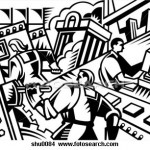
By most measures, the 2008 recession ranks as the worst since the Great Depression.
Not only has it eroded the per capita incomes of entire nations (see Mutualfundreform.com story posted Jan. 27, 2012)), but it has also taken its toll on future retirees due to reduced Social Security contributions and pension benefits, accompanied by lost incomes. The combined effect translates into less income and reduced benefits for millions of future retirees.
A new report from the Center for Retirement research of Boston College found that wage losses and wage stagnation suffered by employees in 2008 and 2009 alone will reduce annual per capita household incomes for people who reach age 70 by 4.3% (the equivalent of $2,3000 annually) for those who were age 25 to 64 in 2008.
But due to stagnant wage growth, the recession’s impact affects all wage earners, even those who held their jobs during the recession, This will accompany workers throughout their careers, the study found. The effect of these lost wages will hit younger workers especially hard.
Using future income projections based on wages and Social Security contributions, here is how certain age groups will suffer from the prolonged effects of the 2008 recession:
- Adults age 25 to 34 in 2008 will see their age-70 incomes fall by 4.9 percent (or $3,000 per person) as a result of the recession. Younger workers are especially hard hit since they lose the benefits of compounding interest. Compounding becomes an especially powerful force in a 401(k) when combined with pre-tax contributions and the fact that they do not pay taxes on their annual 401(k) account earnings.
- Adults who were age 55 to 64 in 2008 will see their incomes fall by 4.1%, mainly due to reduced Social Security credits. The report noted that the Social Security benefit formula indexes earnings at age 60. This put additional emphasis on work history and wage growth before age 60. Changes in work and earnings before age 60 significantly affect future Social Security payments.
When a worker’s wages remain constant, a common event in a recession, this event reduces the Social Security index calculation in the benefit formula for everyone who turns 60 after 2008. The net effect of this event reduces the earnings counted by Social Security, including the money earned before the recession began.
The Poor Get Poorer
Ironically, the people with the most to lose from the ill-effects of the recession, on a relative basis, will be those with the highest incomes. In these cases, the future retirement incomes (expressed in absolute terms) for people in the top tax brackets, will lose the most; about $7,500 per year, for the youngest workers in the top quintile of income. Younger workers in the bottom quintile will lose only $400 per person annually. The source of the decline in earnings will come from reduced payments pensions, retirement accounts and other assets.
In relative terms, the wealthiest should not see a significant decline in their living standards since the income losses represent a small percentage of their total net worth.
But for lower-income workers, the losses will have a much greater impact. The report found that in households, recession-induced incomes will decline. This will increase the number of Americans “living on very limited incomes at age 70.
For people who were age 25 to 64 in 2008; the share with incomes below 125% of the federal poverty level at age 70 will increase 7.4%, “leaving an additional 711,000 adults in or near poverty,” the report said
Source: “The Potential Impact of the Great Recession on Future Retirement Incomes,” Barbara A. Butrica, Richard W. Johnson, and Karen E. Smith, Center for Retirement Research, Boston College, May 2011.










